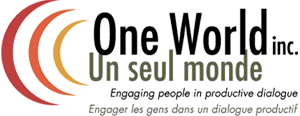Building Competency in Dialogue and Engagement Processes
 In today’s political, social and economic climate, there’s a real need to build competency in designing and implementing effective processes of engagement, dialogue and consultation. This is the case within all types of organizations and institutions (i.e. public, private and governmental). Many leaders, decision-makers and staff are either searching for more creative approaches to finding sustainable solutions to challenging issues and problems, or are being compelled, sometimes legislated, to engage a wider scope of stakeholders in defining, resolving and carrying through on important issues or problems. In an effort to contribute to such competency building, One World has frequently offered training in this area to specific groups and organizations. Recently we offered an open 2-day introductory workshop called, “Dialogue: Key to Productive Engagement and Consultation”. We were pleased to have been able to work with the very mixed group of participants working in diverse sectors who joined us for this workshop.
In today’s political, social and economic climate, there’s a real need to build competency in designing and implementing effective processes of engagement, dialogue and consultation. This is the case within all types of organizations and institutions (i.e. public, private and governmental). Many leaders, decision-makers and staff are either searching for more creative approaches to finding sustainable solutions to challenging issues and problems, or are being compelled, sometimes legislated, to engage a wider scope of stakeholders in defining, resolving and carrying through on important issues or problems. In an effort to contribute to such competency building, One World has frequently offered training in this area to specific groups and organizations. Recently we offered an open 2-day introductory workshop called, “Dialogue: Key to Productive Engagement and Consultation”. We were pleased to have been able to work with the very mixed group of participants working in diverse sectors who joined us for this workshop.
“Dialogue” is a particular way of engaging. It is a structured conversation where diverse people can explore ideas together, share their views, and learn from each other. Much of the work that we do at One World Inc. is informed by the principles and processes of “deliberative dialogue”. Because of this, our workshop was grounded in this approach. Deliberative dialogue is a particular methodology that guides groups through a process of truly meaningful dialogue where they explore options and choices, and weigh, sometimes, competing values and priorities in order to find “common ground” and a best course of action. While situations and contexts do not always lend themselves to undertaking a full scale deliberative dialogue process, the core elements and values can help guide making the decision of what kind of dialogue process, or variant of the “pure model” will work in different situations.
The main objectives for the workshop were three-fold:
- To provide a space where participants could think about the limitations of some traditional consultation practices and, why dialogue can offer an interesting and very productive alternative.
- To explore some of the core principles of good dialogue i.e. what needs to be “on the radar” when you are developing and facilitating a dialogue process.
- Understanding how to design and adapt dialogue processes to best meet your needs.
Exploring the Deliberative Dialogue Process
To launch the training workshop, we gave participants the opportunity to explore the actual process of deliberative dialogue. We had people go through a short version of the process so that they could experience it first hand and get a good sense of the power and potential of the process.
Identifying Steps in Process Design, Facilitation and Adapting the Process to the Work Context
We then took that grounding to help the participants understand how to design a deliberative dialogue, in terms of identifying the steps and stages of the process and how the different phases roll out.
We also explored what would be involved in facilitating a deliberative dialogue session along with practical group and process management tips and strategies. Participants were able to understand the entire process from the beginning to the end. This section really zeroed in on what it actually means to facilitate that kind of a process and the skills and competencies required.
The last component of the workshop focused on introducing how to adapt different processes to ensure they best address the desired outcomes of the dialogue as well as respond to the nature of the participants, the context and the type of issue. The group raised a number of issues and questions that were explored.
Moving Beyond the Classic Model
We launched our workshop by conducting a short version of a “classic” deliberative dialogue forum where we pulled the participants right into the process from the beginning and then began to take it apart and dissect the parts. We provided an introduction to dialogue, why we use it, what kinds of pre-conditions are needed to construct and implement a productive dialogue process and the role of a facilitator and a note taker. We had the participants practice delivering different aspects of the process then sent them home with their manual and homework in preparation for day 2. When they returned, they were invited to carry out part of a dialogue and step into the role of facilitator to provide them with hands on experience. Peers and the trainers provided helpful feedback in a supportive environment.
We then moved beyond the classic deliberative dialogue model to explore variants and adaptations, specifically responding to the work realities of participants who raised such challenges as budget or time constraints, institutional “buy-in” etc. Through the exploration of such challenges we were able to look at ways to customize and tailor a process while also integrating the most important elements of good design to ensure the best outcome.
This recent introductory workshop aimed at building knowledge, insight, confidence and competence in designing and facilitating productive engagement and dialogue processes. It also provided a wonderful opportunity for a diverse group of practitioners to come together, share their knowledge and experience, and expand their “toolkit” of good practice in this important area of work through discussion, demonstration and hands-on application. At One World we are committed to contributing to building a strong network of competent dialogue practitioners. We look forward to offering future dialogue training workshops such as this, but also more in depth training on specific elements such as; issue framing, process design, facilitation and evaluation, along with expanding our bank of good practice resources. If you or your organization are interested in our workshops please do not hesitate to contact us at: info@owi.ca.
